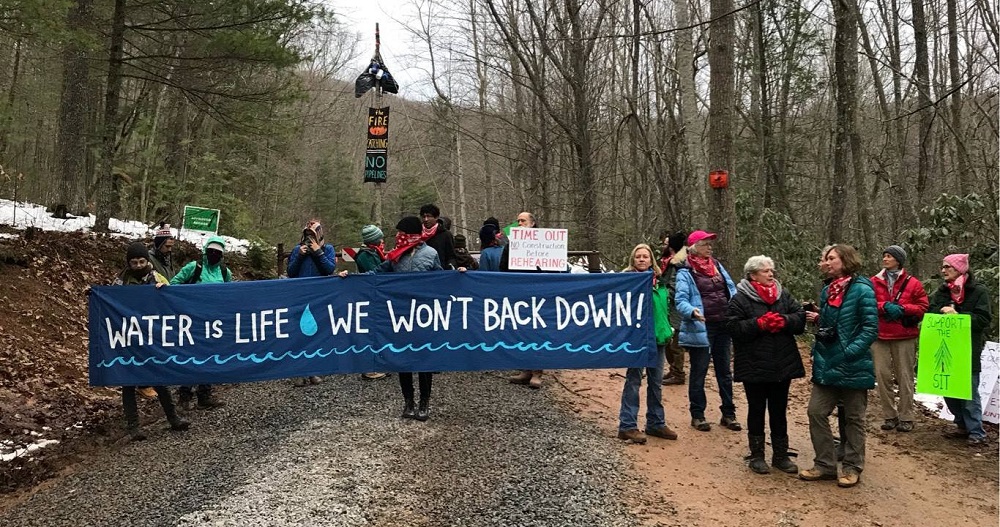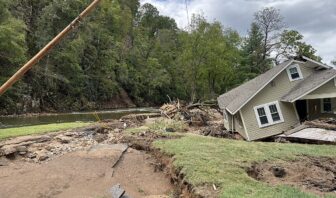The SWCB Failed to Require Individual Reviews of Pipelines’ Impact, Putting Virginia’s Waters at Risk for Pipelines that Have Already Caused Numerous Violations
RICHMOND, VA — Today, the Virginia Department of Environmental Quality provided misleading and incomplete information to the Virginia State Water Control Board during its review of whether the US Army Corps of Engineers’ Nationwide Permit 12 (NWP 12) for the Atlantic Coast Pipeline and Mountain Valley Pipeline is sufficient to protect Virginia’s water quality. The Board failed to take its opportunity to revoke this permit, instead calling on the DEQ to aggressively enforce the erosion and stormwater controls for the pipelines and respond to complaints promptly.
The Department of Environmental Quality, headed by the controversial David Paylor, continued to strongly recommend that the Board allow pipeline construction to proceed, despite mounting evidence that MVP and ACP have already harmed water quality.
Anne Havemann, General Counsel for the Chesapeake Climate Action Network, issued the following statement in response:
“The pipeline companies have cut corners and aggressively pushed for approval before complete information about the impacts were understood. Reviewing federal courts have thrown out key permits for both pipelines, finding that agencies failed to adequately protect endangered species, national forests, and treasured places such as the Blue Ridge Parkway. These invalidated permits were so critical that FERC has halted construction on both pipelines.
“David Paylor’s DEQ likewise pushed for approval from the State Water Control Board before the impacts of the pipelines were understood — the agency recommended approval before critical pollution mitigation plans were in place. Today was the Board’s opportunity to hit pause on construction and require the agency to fully account for impacts to Virginia’s waters — a desperately needed pause for the landowners whose drinking water, streams, and property are threatened by these pipelines. We’re sorely disappointed that the Board passed up this critical opportunity.
“Instead of requiring an individual review, the Board instead called on DEQ to conduct aggressive compliance efforts. While we are still reviewing the Board’s decision it appears to have no teeth, and could allow sediment to continue to be dumped into the water with impunity. In the midst of public outcry and ongoing harm to water quality, we cannot applaud a decision that merely requires the DEQ do the job it should have been doing all along.
“Today is a shameful day for David Paylor’s Department of Environmental Quality, and a sad day for Virginians. But, the fight is not over. We will continue taking these pipelines to court. We are confident that the federal courts will continue to overturn the insufficient permits for these pipelines, and evidence will prove once and for all that these pipelines should never be built.”
Background Information
The Mountain Valley Pipeline has been issued six notices of violation for failing to prevent erosion and sediment from damaging streams. Five notices were issued by the West Virginia DEQ and one by Virginia’s DEQ, which addressed six separate areas of concern. The Atlantic Coast Pipeline, which is not yet under construction in Virginia, has been issued one notice of violation for tree-felling in buffer zones meant to protect stream and wetland crossings. Additionally, the citizen monitoring group Mountain Valley Watch has submitted 58 reports of suspected improper erosion controls at Southwest Virginia construction sites to the DEQ.
The majority of comments submitted concerning this permit (9,100 of 17,000) urged the Board to reject the Army Corps’ “blanket” permit, and to conduct individual stream crossing reviews instead. According to an analysis conducted by Wild Virginia and the Dominion Pipeline Monitoring Coalition, 815 of the comments submitted were unique, 695 of which were opposed to the permit or the pipelines in general. The comments in opposition also provided far more detailed information than the comments in support.
DEQ even misrepresented the public opposition to the projects. An analysis of the comments by Wild Virginia and the Dominion Pipeline Monitoring Coalition found that a majority of commenters questioned whether the Army Corps’ nationwide permit was sufficient, with 9,141 opposing and 8,318 in support. The DEQ presented a much different number: Only 4,582 opposed and 8,086 in support. The discrepancy can be explained by the fact that DEQ disregarded all petitions, though it did not disregard form letters. This decision skewed the result in favor of the NWP 12. This approach is unsupportable. If form documents that express no unique opinions and provide no unique information are to be counted individually, then petition signatures should also have been counted.
This hearing came at an opportune time, as a federal appeals court has revoked key permits for both the Atlantic Coast Pipeline and Mountain Valley Pipeline, leading the Federal Energy Regulatory Commission to order a halt to all new construction activity for both pipelines.
CCAN is involved in a lawsuit challenging FERC’s certificate of public convenience and necessity for the Atlantic Coast Pipeline and the Mountain Valley Pipeline, and efforts to challenge the Army Corps’ permit for the pipelines.
CONTACT:
Denise Robbins, Chesapeake Climate Action Network, denise@chesapeakeclimate.org, 608-620-8810
Anne Havemann, General Counsel, 202-997-2466, anne@chesapeakeclimate.org,
Jamshid Bakhtiari, Virginia Field Coordinator, 757-386-8107, jamshid@chesapeakeclimate.org
###





